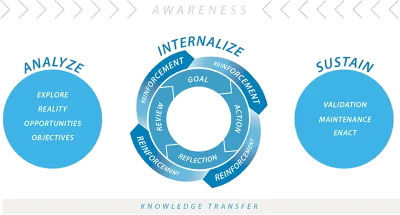WAY OF WORKING ONLINE COACHING
We live in a digital age: we work, learn and connect more and more remotely. I have specialised as an eCoach, because the need for managing one’s own time and work-life balance is paramount. eCoaching is online guidance in which the learning and reflection process is digital. This offers more convenience, flexibility and frequent contact moments than regular coaching, allowing you to experience faster progress and success. The blended approach of BLOMON combines different online coaching methods with, when possible, face-to-face coaching.

Duration & Medium
An online coaching program lasts on average 12 weeks. We have two-way contact every week. I use various types of medium; phone/video coaching is combined with mail coaching via a secure digital platform. The medium is based on your objective of the coaching and learning preference. Of course, we can adapt the coaching program based on your needs. A face-to-face session is possible in the area of Bangkok and Pattaya, Thailand. When I am in the Netherlands, a few times a year, we can schedule face-to-face or walking coaching in the area of Amsterdam.
Methods
I use different methods and assignments during the coaching program. You can think of Rational-Emotive Therapy (RET), Transactional Analysis (TA), Acceptance and Commitment Therapy (ACT), Solution-oriented, Development-oriented, Systemic, Mindfulness, etc. We will also practice breathing exercises to experience more strength, inner peace and clarity.
Accelerated change in behaviour
The coaching program is structured according to the Accelerated Behavioural Change (ABC) Model and consists of three phases: 1) analyse your situation and objectives, 2) practice real-life scenarios, reflecting and internalize new behaviour, and 3) sustain what is learned and developed. This model has been specifically designed for online coaching with the aim of achieving accelerated behavioural changes and therefore success.
